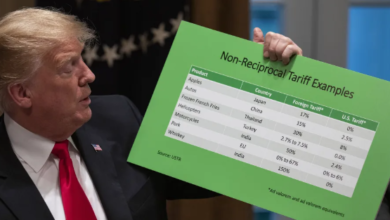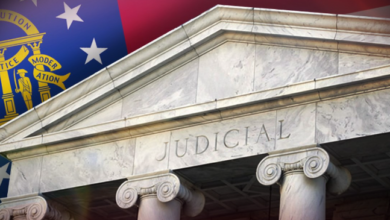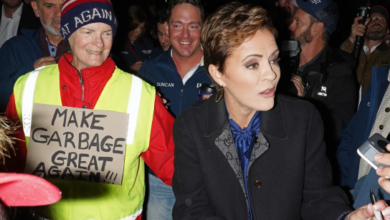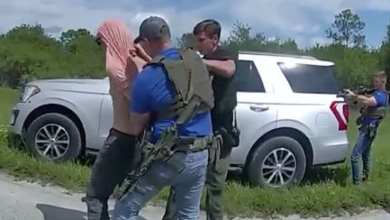Everything You Need To Know About The DOJ Investigation Into Jan. 6


The Justice Department probe into the Jan. 6, 2021, insurrection has come a long way since its start in the immediate aftermath of the attack on the U.S. Capitol.
Investigators have already entered the 60-day period preceding the November midterm elections, during which prosecutors typically keep quiet to avoid any appearance of interference in the upcoming races.
Here’s what we know so far regarding the department’s largest investigation to date, and what federal prosecutors are looking into as part of the wide-ranging probe:
Capitol rioters
The first stages of the investigation focused on the people who violently mobbed the Capitol on Jan. 6, resulting in destruction and multiple deaths. Investigators examined their actions and whether they were affiliated with more prominent figures in the effort to challenge the 2020 presidential election results.
So far, more than 870 people have been charged with offenses related to the Jan. 6 riots. Of these, more than 260 were charged with assaulting law enforcement, according to DOJ.
A former Army reservist who once showed up for work dressed as Adolf Hitler was sentenced Thursday to four years in prison followed by 36 months of supervised release on felony and misdemeanor charges.
Last week, a Michigan man was sentenced to five years in prison followed by three years of supervised release on similar charges for his Jan. 6 actions, which included storming the Capitol and staying on the premises for over an hour, according to a DOJ press release. That man made a Facebook post after the attack calling it “the proudest day of my life.”
Earlier this month, a retired New York City police officer was given the longest sentence of any of the rioters thus far ― 10 years in prison for offenses that include assaulting an officer with a metal flagpole.
DOJ investigators have examined how the Capitol rioters got to Washington, D.C., and who paid for their travel and accommodations. Many of the rioters self-funded their trips, but groups aligned with former President Donald Trump also advertised and helped support caravans, according to The Washington Post.
Extremist groups
The Justice Department has also focused on two extremist groups: the Proud Boys and the Oath Keepers.
Five members of the Proud Boys, including their leader Enrique Tarrio, were indicted on seditious conspiracy charges in June for, among other things, planning and setting the insurrection in action.
Earlier this month, two members of the Proud Boys who wrote “Murder the Media” on a door near the entrance of the Capitol pleaded guilty to trying to obstruct the certification of Joe Biden’s win on Jan. 6. Joshua Pruitt, another Proud Boys member, was sentenced to nearly five years in prison in August.
Stewart Rhodes, the founder of the Oath Keepers, and 10 other members of the right-wing group were charged with seditious conspiracy earlier this year for their efforts to block the peaceful transfer of power on Jan. 6. The indictment said the group had been prepared to use weapons to meet their goals.
‘Stop the Steal’ rally
The Justice Department has investigated rallies that occurred prior to the attack on the Capitol, including the “Stop the Steal” rally, organized by the group Women for America First, that took place at the Ellipse in Washington on the morning of Jan. 6. The Ellipse rally has also been probed by the House select committee looking into the insurrection.
Last September, DOJ subpoenaed the group’s head, Amy Kremer; her daughter Kylie, who serves as the organization’s executive director; and Cynthia Chafian, who applied for the event’s permit, according to CBS News.
This winter, a federal grand jury subpoenaed Trump allies who were involved in planning and financing that rally. Trump spoke at the event at about noon on Jan. 6. Other people in the conservative movement were also in attendance, including Ginni Thomas, the wife of conservative Supreme Court Justice Clarence Thomas, who said she left before Trump addressed the crowd. Thomas has reportedly agreed to sit for an interview with the House Jan. 6 panel in the coming weeks.
Ali Alexander, a right-wing activist who organized other events challenging Biden’s win, received a grand jury subpoena earlier this year, a sign that the probe was broadening to examine those who organized pro-Trump rallies in November and December 2021, as well as on Jan. 6, The New York Times reported.
Alexander was involved in planning a Jan. 6 rally on the east side of the Capitol, which ended up getting canceled due to the day’s violence.
Alexander was reportedly interviewed in front of a grand jury for over three hours in June. The subpoena, which prompted the interview, requested information concerning lawmakers and people in the Trump administration who dealt with those rallies or were intent on blocking Biden’s win.
In a video posted online, Alexander claimed that he and three Trump-supporting GOP lawmakers — Reps. Andy Biggs (Ariz.), Mo Brooks (Ala.) and Paul Gosar (Ariz.) — had identified Jan. 6, the day Congress was due to vote to certify Biden’s election win, as an inflection point.
“We four schemed up of putting maximum pressure on Congress while they were voting,” he said.
Alexander, who has testified before the House Jan. 6 panel, was close to Republican political strategist and Trump ally Roger Stone, and kept in touch with him about “logistics” regarding the Jan. 6 events, his lawyer told the Times. Alexander provided the House committee access to his communications with Stone on Jan. 6.
In an August interview with the Nebraska Examiner, Alexander said he “had to testify before the grand jury that’s investigating the alternate electors,” suggesting that investigators are looking to connect the dots between the various elements involved in the plan to overturn the election.
The ‘fake electors’ scheme
Investigators have also been digging into a plan devised by Trump and his allies to replace electors for Biden with ones in favor of Trump in several states that Biden won, which would have disrupted the certification of the now-president’s victory.
In May, investigators started looking into the lawyers involved in helping Trump devise the fake electors plot. Investigators issued subpoenas requesting that recipients submit any communications they had with lawyers advising Trump, including John Eastman, Rudy Giuliani, Jenna Ellis and Kenneth Chesebro. About 20 of those subpoenas were related to the fake electors plot, according to the Times.
In June, FBI agents seized Eastman’s phone. The attorney was one of the main architects of the plan to block the certification of Biden’s win. He also spread false claims of election fraud in Georgia in December 2020.
On the same day in June, FBI agents searched the Virginia home of former DOJ official Jeffrey Clark. Clark’s lawyer said the authorities recovered electronic devices as part of a criminal probe into three Jan. 6-related charges. Clark is being investigated for conspiracy, obstruction and making false statements, according to a recent filing by the D.C. Bar.
In December 2020, Clark allegedly wrote a draft letter in which he falsely claimed the DOJ had “identified significant concerns that may have impacted the outcome of the election in multiple States, including the State of Georgia.” Clark also participated in devising the fake electors scheme.
Clark pressed acting Attorney General Jeffrey Rosen, and his deputy, Richard Donoghue, to send the draft letter, but they refused.
In August, law enforcement officers seized the phone of Rep. Scott Perry (R-Pa.). The House select committee has already shown messages that Perry exchanged with former Trump chief of staff Mark Meadows, indicating the congressman was acting as intermediary between Meadows and Clark.
Trump reportedly wanted to replace Rosen with Clark, but backed down after Donoghue told Trump that he and others in the department would resign en masse if he went through with the plan.
Former White House lawyer Pat Cipollone and his deputy Patrick Philbin were among those who threatened to walk away in the event of Clark’s appointment. Cipollone and Philbin both reportedly testified before a federal grand jury this month after they were served with subpoenas.
Cipollone was among the most senior members of the Trump administration inside the White House on Jan. 6, and attended meetings where Trump and his allies strategized about overturning the 2020 election results.
Former Attorney General Bill Barr called Cipollone’s subpoena “the most significant.”
“This suggests to me that they’re taking a hard look at the group at the top, including the president and the people immediately around him who were involved in this,” Barr told CBS News last month.
In recent weeks, the department also issued subpoenas to about 40 people familiar with Trump’s efforts to overturn the 2020 election, according to the Times.
FBI agents recently seized the phones of two Trump advisers: Boris Epshteyn, who offers legal counsel to Trump, and Mike Roman, director of the Election Day operations of Trump’s 2020 campaign. The Times reports they are relevant to the DOJ’s investigation into the fake electors scheme.
One of the subpoenas went to Dan Scavino, a current adviser to Trump who served in his administration as deputy chief of staff for communications and social media director. Bernark Kerik, a former New York City police commissioner and friend of Giuliani who worked with the former mayor to push unfounded claims of voter fraud, was also subpoenaed.
The Post said it reviewed three of the most recent subpoenas, which requested several pieces of information, including communications the recipients had with people involved in the fake electors scheme in six states Biden won, and others in Trump’s orbit who helped put the plan together.
Investigators have also sought to obtain direct testimony and documents from those who were put forward as electors in favor of Trump.
The Justice Department in June subpoenaed two Arizona state lawmakers ― Karen Fann, president of the state Senate, and state Sen. Kelly Townsend ― asking both to turn over documents and communications “relating to any effort, plan or attempt to serve as an Elector” for Trump and/or then-Vice President Mike Pence, according to the Post.
Donald Trump’s own actions
The DOJ has zeroed in on Trump’s actions in the final two months of his administration. Federal investigators have reportedly asked witnesses about meetings the former president held following his election loss in November 2020, and how involved he was with lawyers who carried out the fake electors scheme.
Prosecutors were also reportedly interested in learning more about the orders Trump gave his lawyers — including Eastman and Giuliani — and staff, as well as his efforts to pressure Pence to block the certification of Biden’s win.
Two former Pence aides, Marc Short and Greg Jacob, testified before a federal grand jury in July following a subpoena.
“I can confirm that I did receive a subpoena for the federal grand jury, and I complied to that subpoena,” Short told CNN at the time. “But under advice of counsel, I really can’t say much more than that.”
Short and Jacob were in the White House during the final days of the Trump administration, and in the Oval Office for a meeting on Jan. 4, 2021, in which Eastman tried to persuade Pence to delay officiating Biden’s win.
Meadows complied with a DOJ subpoena that sought records related to Jan. 6, reportedly turning over documents that he’d already submitted to the House select committee investigating the insurrection before he stopped cooperating with them. The DOJ subpoena did not require Meadows to testify, a source told the Post.
In April, the DOJ had obtained Meadows’ phone records, the Post said. His deputy, Ben Williamson, was also reportedly served with a subpoena, requesting documents and testimony relevant to Jan. 6 and the Trump team’s effort to undo Biden’s win, CNN reported.
The role of Trump’s Save America PAC
Federal investigators have probed Trump’s political action committee, the Save America PAC, which was created after the 2020 election and was originally used to raise funds for the Trump campaign’s efforts to challenge Biden’s win.
In recent weeks, a grand jury has issued subpoenas requesting information about the PAC’s activity. Those subpoenas appear to have been issued by a different grand jury than the one investigating the fake electors scheme, The New York Times reported.
Several subpoenas have also been handed out to lower- and mid-level staff from the White House and Trump’s 2020 campaign, the Times said.
Those include two former Trump White House aides who continued working with Trump after the 2020 election: William Harrison, who served as special assistant to the president for operations in the White House, and William Russell, who was a special assistant and the deputy director of presidential advance operations. Others include Ivanka Trump’s chief of staff, Julie Radford; Trump aide Nicholas Luna; and Trump’s 2020 campaign chief financial officer, Sean Dollman.
The subpoenas seek information about communications with lawyers, two of whom — Ellis and Chesebro — were also looked at for their role in the fake electors plot.
Stephen Miller, a former senior policy adviser in the Trump administration, and Brian Jack, who served as White House political director, also received subpoenas requesting information about the PAC and the fake electors plot, the Times said. Some of those subpoenaed, including Miller, have received payments from Trump’s PAC.
The PAC is reportedly footing the bill for Chris Kise, a high-profile attorney who was given a $3 million advance to represent Trump in the separate DOJ investigation of Trump’s handling of classified documents taken from the White House. Kise will reportedly represent Trump in any case arising from DOJ’s Jan. 6 probe, according to Politico.
The fact that the Justice Department is intent on obtaining information about the PAC’s activity suggests prosecutors are looking for proof that fraud was committed, according to the Post. A source also told the Post the department has brought in fraud and public corruption experts to assist with the probe.
How does the investigation end?
The possibility that a former president could be criminally charged is unprecedented, but Attorney General Merrick Garland has pledged his office will pursue the Jan. 6 investigation “without fear or favor.”
“We intend to hold everyone, anyone, who was criminally responsible for events surrounding January 6 ― for any attempt to interfere with the lawful transfer of power from one administration to another ― accountable,” Garland told NBC’s Lester Holt in July. “That’s what we do. We don’t pay any attention to other issues with respect to that.”
Former Attorney General Eric Holder has predicted Trump will “ultimately” face criminal charges himself as a result of this investigation.
“My guess is that by the end of this process, you’re going to see indictments involving high-level people in the White House. You’re going to see indictments against people outside the White House who were advising them with regard to the attempt to steal the election,” Holder told radio host Joe Madison on SiriusXM Urban View last month. “And I think ultimately you’re probably going to see the president, former president of the United States indicted as well.”
[ad_2]
Source link





